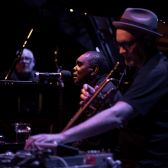16 April 2025
‘Raki’, Celebrating the Virtue of Aboriginal Ceremonial Music
 Image: Peter Knight, David Wilfred and Paul Grabowsky (front to back) perform ‘Raki’.
Image: Peter Knight, David Wilfred and Paul Grabowsky (front to back) perform ‘Raki’. © David Rogers Photography
Recent commentary on including Indigenous knowledge in the national curriculum is often poorly informed. Rather than looking to the ways Aboriginal traditions can shape Australian life today, Indigenous knowledge is seen as part of a superseded past.
Raki, the latest album from Daniel Wilfred, Paul Grabowsky and Peter Knight, demonstrates the living value of Indigenous knowledge. While it skilfully incorporates traditional Yolŋu song and contemporary improvisation, Raki also renews classical notions of virtue cultivated through artistic performance.
Raki can enrich our ideas about music and why it matters.
At its heart, the album is rooted in the manikay tradition, a ceremonial music performed by the Yolŋu people of Arnhem Land. These songs play an important role in connecting different family groups to their homelands, celebrating and strengthening cultural and generational ties.
Meaning 'string,' is about the way many different pasts interweave in our present, shaping who we are.
String is the central theme of the songs reimagined in this recording. One of the song texts describes string as it was traditionally made by rolling together the fibres of the pandanus plant. This string can be used for everyday things like fishing or weaving. It also has a ceremonial purpose: sacred strings are made from the hair of family members, woven together over many generations.
Raki also acclaims the power of manikay to shape new connections and friendships. The album marks an evolution in the collaborations between Wilfred, Grabowsky, and Knight. With over two decades of musical partnership between them, Raki introduces a more streamlined approach: the music is interactive and playful, weaving together diverse musical influences and styles, from the harmonic shifts of Protestant hymns and the subtle tone-colourings of Miles Davis.
Beyond its musical innovation, Raki also revives classical ideas about music through the notion of virtue, as understood by both ancient Greek philosophy and Yolŋu people. For the ancient Greeks, virtue was associated with excellence in the fulfillment of a role. This concept resonates with the Yolŋu idea of gakal, or 'skill,' particularly when applied to musical performance. For Yolŋu performers, a virtuous performance stems from years of disciplined learning and mastery of the craft - shown in nuanced and skilful realisation of melody, poetry and timbre.
Within these songs, string also symbolises ancestral connections and identities that are carried through the generations. A performance is considered virtuous if it sustains this core narrative with brilliance, virtuosity and power.
For Wilfred, performance is a responsibility that brings the past into the present, to nourish and guide the present generation. Performance of ancestral songs calls all who participate to a point of decision. As he puts it, "When we gather to sing, we decide if we're going to listen to the old story - the old story in a new generation. It doesn't change, it just grows" - like string that grows longer as more fibres are woven in.
Entwining these values within musical expression, Raki is more than a performance of virtue signalling - an on-stage demonstration of liberal inclusivity. Instead, 'Raki' invokes competency, as we listen closely to the threads of identity and history that constitute who we are. It also invokes excellence and the skilful interpretation of those pasts, as they open new possibilities for present life.
As Wilfred explains, string is about unity: "Raki means to be one." The energy and joy of this collaboration reflect the enduring power of traditions to bring people together within a living, evolving expression of culture and identity.
'Raki' will be released by Earshift Music in two phases. The first, a 'single' with video, will be released on 17 April 2025. The album will be released on 16 May 2025. Find out more.
© Australian Music Centre (2025) — Permission must be obtained from the AMC if you wish to reproduce this article either online or in print.
Dr Samuel Curkpatrick is a Research Fellow of the Indigenous Knowledge Institute, The University of Melbourne. He specialises in Australian Indigenous music and philosophical issues of language, epistemology and religion. Sam has collaborated on music performances and teaching with Yolŋu and Warlpiri ceremonial leaders, exploring creativity and understanding across diverse knowledge traditions. His books include Singing Bones: Ancestral Creativity and Collaboration and Indigenous Knowledge: Australian Perspectives.
Comments
Be the first to share add your thoughts and opinions in response to this article.
You must login to post a comment.